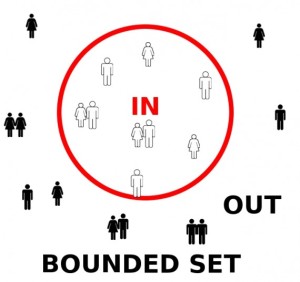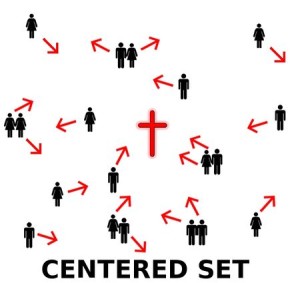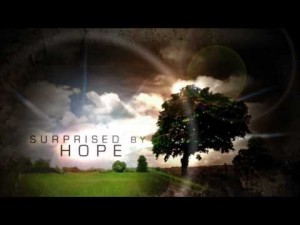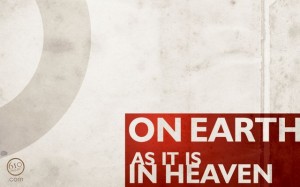 Below is the text from this past Sunday's worship gathering dealing with the 4th part of the Lord's Prayer along with the questions that we discussed. Would love to hear your thoughts, comments, insights, etc..
Below is the text from this past Sunday's worship gathering dealing with the 4th part of the Lord's Prayer along with the questions that we discussed. Would love to hear your thoughts, comments, insights, etc..
Today we continue our 6 week series looking at the Lord’s Prayer found in Matthew 6:9-13. Or as an author has said that we should call the Lord’s Prayer, the Disciple’s Prayer, due to its significance and what it teaches in respect to being followers of Jesus Christ.
We started 3 weeks ago with the Lord’s Prayer at the beginning (which is a really good place to start). We started with Our Father who is in heaven, hallowed be thy name. We spent time talking about the struggle that some of us have in praying to God the Father, due to our struggle with our earthly Father’s. We also talked about the beautiful fact that we are adopted as sons and daughters of God the Father, and how he has redeemed our past, and give us an inheritance in the Kingdom of God.
Two weeks ago we covered the next part of the prayer “Thy Kingdom come, thy will be done on earth as it is in heaven.” We talked about the idea of what it would look like if heaven touched down on earth, and the fact that heaven did touch down on earth 2,000 years ago with the person, work, ministry, and mission of Jesus. We also talked about the mission of Jesus found in Luke 4 and talked about that it was his mission, that by definition, if we are followers of Jesus, it should be our mission as well. Things like preaching good news to the poor, setting the oppressed free, proclaim freedom for the prisoners, recovery of sight to the blind, and to proclaim the year of the Lord’s favor.
Last week we talked about the third part, “Give us this day our daily bread.” We talked about the communal nature of this prayer, and that we can be the answer to this part of the prayer for others who need their daily bread, especially when we have 365 daily breads all ready stored up for ourselves. We talked about God’s provision that happens daily whether that would be food, or encouragement, or whatever sustenance that can get us through.
Today we cover the next part of this radical, Kingdom of God, upside down, prayer. The part that says, “Forgive our debts as we forgive our debtors.” So let’s look again at the prayer and then we’ll unpack it together using a parable that Jesus told that I believe connects nicely to this part of the prayer. Matthew 6:9-13 says, ““This, then, is how you should pray: “‘Our Father in heaven, hallowed be your name, your kingdom come, your will be done, on earth as it is in heaven. Give us today our daily bread. And forgive us our debts, as we also have forgiven our debtors. And lead us not into temptation, but deliver us from the evil one.’
So the first thing that I noticed about this part of the prayer is the usage of the word debt and the word debtor. In the Lukan account in chapter 11 we see Luke rending the prayer, “Forgive our sins as we forgive those who sin against us.” So right there we notice a tension between the two texts. But I believe this goes to show the fact, that as we learned and talked about every week of this series that try as you might you can’t separate spiritual needs from material needs.
In fact all 3 Aramaic versions of this text, Jesus uses the Aramaic words Khuba, which means both material debt and sin. Jesus knew how all-consuming financial debt was for people. Debt, in Jesus time, could land a person in indentured servitude or even prison. When people become slaves to debt, they forfeit their freedom and will. Jesus also knows that sin, can also be all consuming. When we become slaves to sin, we end up as indentured slaves and in prison and when we become slaves to sin; we forfeit our freedom and will. The bondage of sin and material debt limits our ability to be faithful and submitted servants of God. This just goes to show again that our physical conditions and situations impact our spiritual conditions and situations. That you can’t separate the flesh from the spirit, even though many others in the past and even now try to.
I wonder if we have so easily resorted to the words trespasses and sins instead of the word debt and debtors because it is easier to talk about my own sins and God’s forgiveness instead of talking about the idea of physical debt. Plus if taken this way, this text becomes exceedingly countercultural and super radical. More radical than we realize.
What if and this is a what if. What if this text means that we are literally to forgive people’s material debts? And trust that God will provide for us and the ones we forgive. What if Jesus, in this text, is calling communities of Christ followers to work to help each other get freed from debt? Be freed from the bondage and enslavement to Money. What would it be like if the Christian community would literally help someone get out of material debt (and help them stay out of it) by using the pulled resources of the Christian community? If this is true, then he is calling his people to live counter culturally. To do otherwise in this respect is not only an act of disobedience but an active step into the very bondage that robs us of our freedom to live obediently. To forgive people their debts frees people to live with that same single-minded devotion to God, which would otherwise be compromised.
Another thing I noticed was it’s placement in the prayer, right after the commitment to trust God with the daily bread that he gives to us. This statement, “Forgive our debts as we forgive our debtors” is first and foremost a declaration of our absolute dependence on God’s grace and forgiveness, daily and ultimately. Further, it is a reminder that our forgiveness is entirely undeserved, extended to us before (or whether) we asked for it. Therefore, for us to expect the gracious forgiveness of God while holding back forgiveness from others is absolutely unacceptable to God. Jesus goes so far as to say that forgiveness for our own sins is contingent on our extending entirely undeserved forgiveness to those who have wronged us, before (or whether) they ask for it. In fact Jesus tells a story that helps to unpack this idea of forgiveness of debts and sins. That story can be found in Matthew 18:21-35.
“Then Peter came to Jesus and asked, “Lord, how many times shall I forgive my brother or sister who sins against me? Up to seven times?” Jesus answered, “I tell you, not seven times, but seventy-seven times. “Therefore, the kingdom of heaven is like a king who wanted to settle accounts with his servants. As he began the settlement, a man who owed him ten thousand bags of gold was brought to him. Since he was not able to pay, the master ordered that he and his wife and his children and all that he had be sold to repay the debt. “At this the servant fell on his knees before him. ‘Be patient with me,’ he begged, ‘and I will pay back everything.’ The servant’s master took pity on him, canceled the debt and let him go. “But when that servant went out, he found one of his fellow servants who owed him a hundred silver coins. He grabbed him and began to choke him. ‘Pay back what you owe me!’ he demanded. “His fellow servant fell to his knees and begged him, ‘Be patient with me, and I will pay it back.’ “But he refused. Instead, he went off and had the man thrown into prison until he could pay the debt. When the other servants saw what had happened, they were outraged and went and told their master everything that had happened. “Then the master called the servant in. ‘You wicked servant,’ he said, ‘I canceled all that debt of yours because you begged me to. Shouldn’t you have had mercy on your fellow servant just as I had on you?’ In anger his master handed him over to the jailers to be tortured, until he should pay back all he owed. “This is how my heavenly Father will treat each of you unless you forgive your brother or sister from your heart.”
So in this text we see the connection that Jesus makes between debts, forgiveness, and sin. He tells this story, which while it was a parable; no doubt it was played out many times through Israel in the first century (as far as debts). Peter comes to Jesus and asks him how many times he should forgive someone who sin against him. We don’t know if Peter had someone in mind who had wronged him, and if he wanted to have an excuse to not forgive this person. And so that begins the story that Jesus uses to show Peter (and us) that our debtedness and forgiveness is intrinsically linked to our forgiveness of others debts that they owe us. That story is what we call the Parable of the unmerciful servant.
What we see in this parable is the story of a servant of the king who had a 10,000 bag of gold debt to be paid to the King. He couldn’t pay the debt no matter how much he promised. It clearly represents an unpayable debt. So he begs for forgiveness and also for patience from the King, and the King compassionately and mercifully wipes away this servant’s debt. But apparently this act of grace, mercy, and forgiveness shown to the servant from the King didn’t have a huge, lasting impact on the servant as you think it would. No, instead the servant turns around, finds another servant that owes him a fraction of what he owed the King, and proceeds to try to beat it out of him. The other servant has the exact same plead that was used by the servant with the greater debt, but to no avail. Instead he threw the man into prison until the debt could be paid. Well of course, if you were witness to this lack of mercy from someone who received even greater mercy, you would be flabbergasted and would say something to the King. So that is what the other servants did. And the King went off on the servant and threw him into prison to be tortured and until he could pay off his debt. Jesus ends the story by saying this is exactly how Jesus will treat you unless you forgive your brother or sister from your heart.
Think of it this way, any debt that you have owed to you is absolutely insignificant in relation and in comparison to the debt that God has forgiven you. If Jesus, while having been beaten, abused, whipped, scorned, and then hung on the cross, could, from the cross, utter these words, “Father forgive them for they know not what they do.”, how much more should we be able to forgive someone when they wrong us. And this isn’t to minimalize, negate, or say what someone has done to you is right, okay, or you should just forget about it. But none of us has been crucified, beaten, whipped, etc….
The truly repentant truly understand the radical nature of God’s grace and their own undeserving nature. Knowing this, how can we refuse to extend to others what he has give to us so freely? In other words, when we refuse to extend forgiveness to others, our own supposed repentance comes into question.
Let’s spend some time together discussing the implications of these texts on our everyday lives. Let’s discuss the ideas of debt forgiveness, forgiveness of sins, and the difficulty we face with applying these things to our lives.
1. What questions, ideas, thoughts, comments, insights, push back, etc... do you have regarding the text and the message?
2. What are your thoughts regarding the use of the word Debt and Debtors in the Lord's Prayer? How might these ideas be played out both in the world stage (nations, jubilee etc..) and also personally and communally?
3. Are there people in your life that God is calling you to forgive and if possible reconcile? What steps might you take in making this a reality?
4. What is God saying to you and what are you going to do about it? What is God saying to us and what are we going to do about it?















